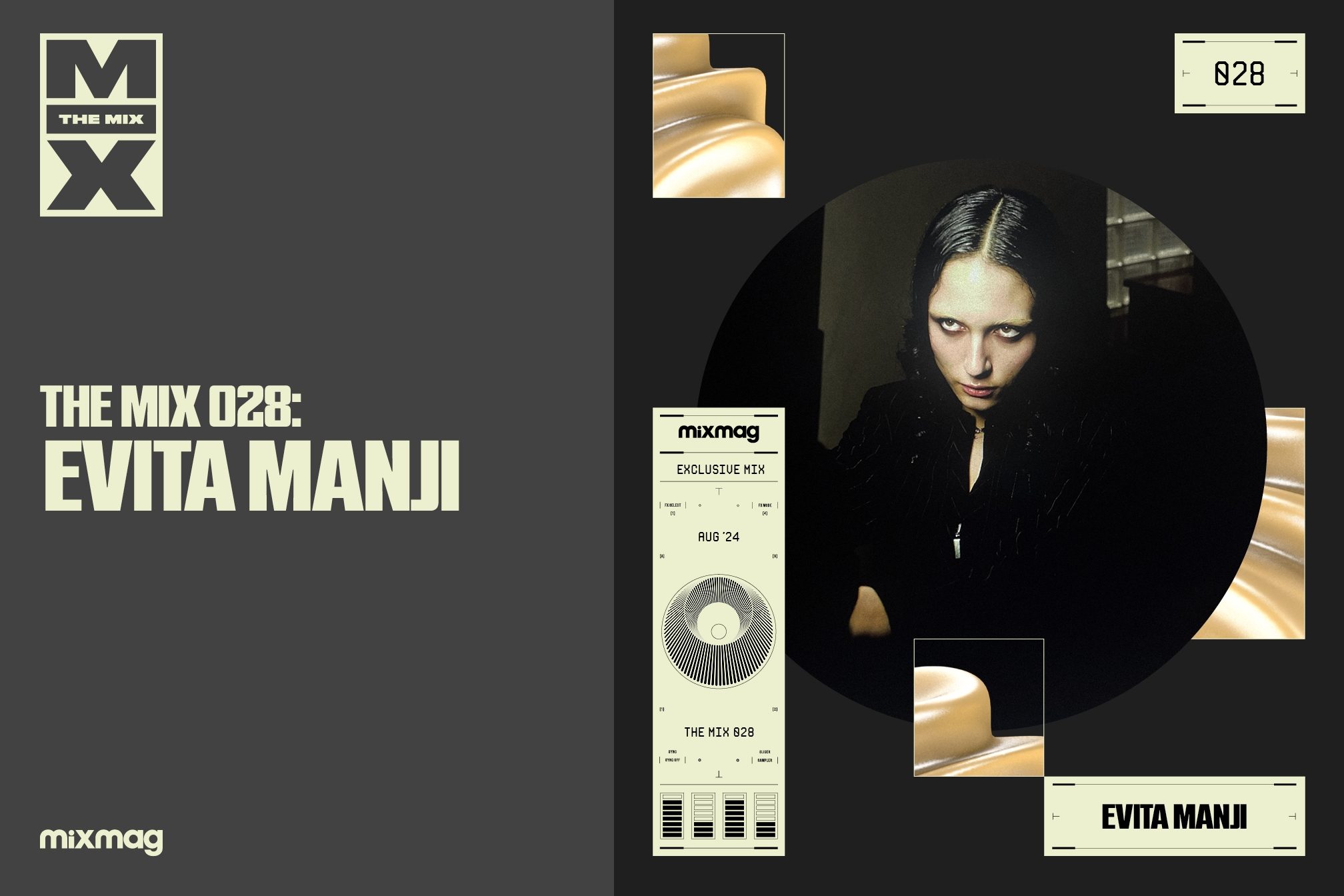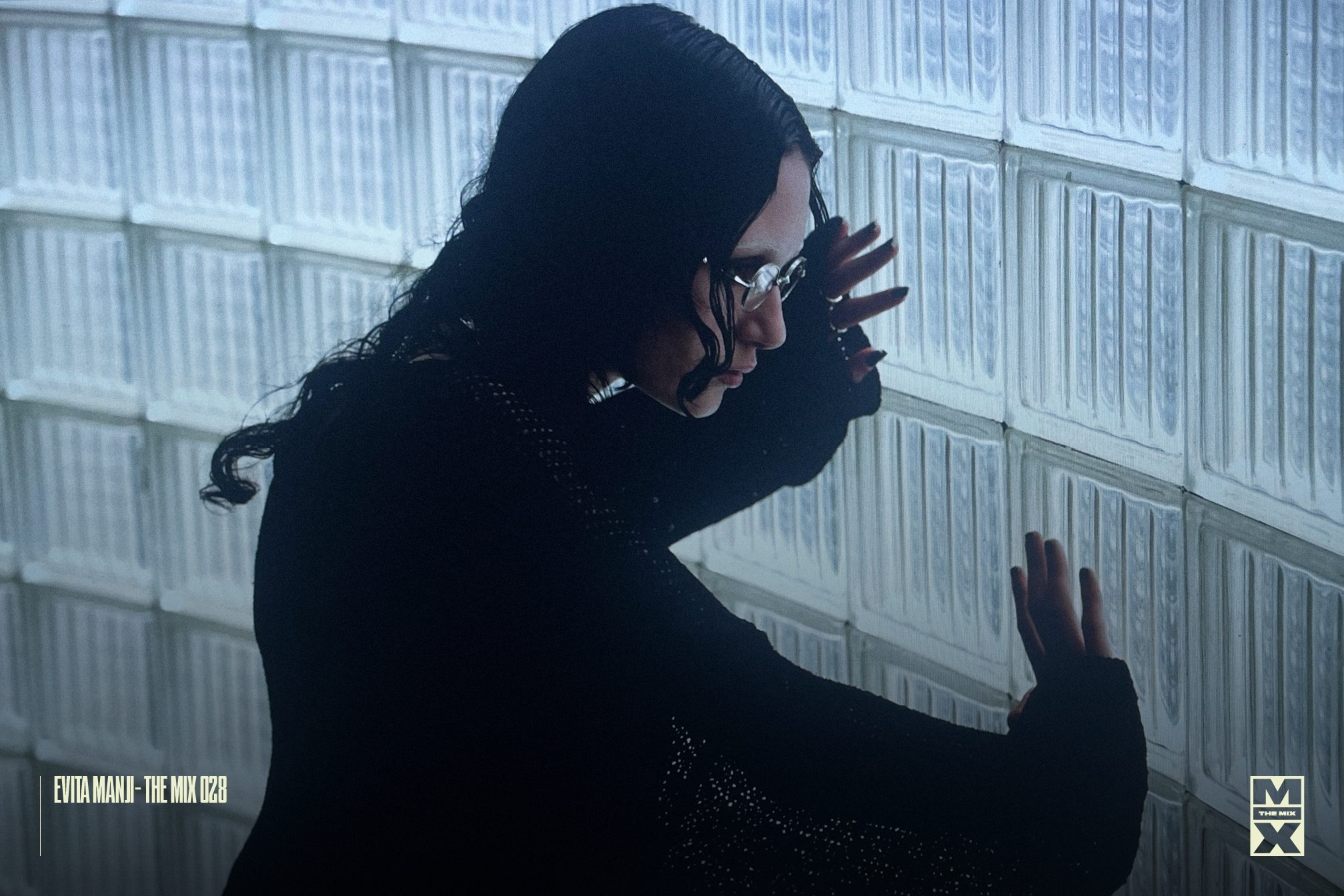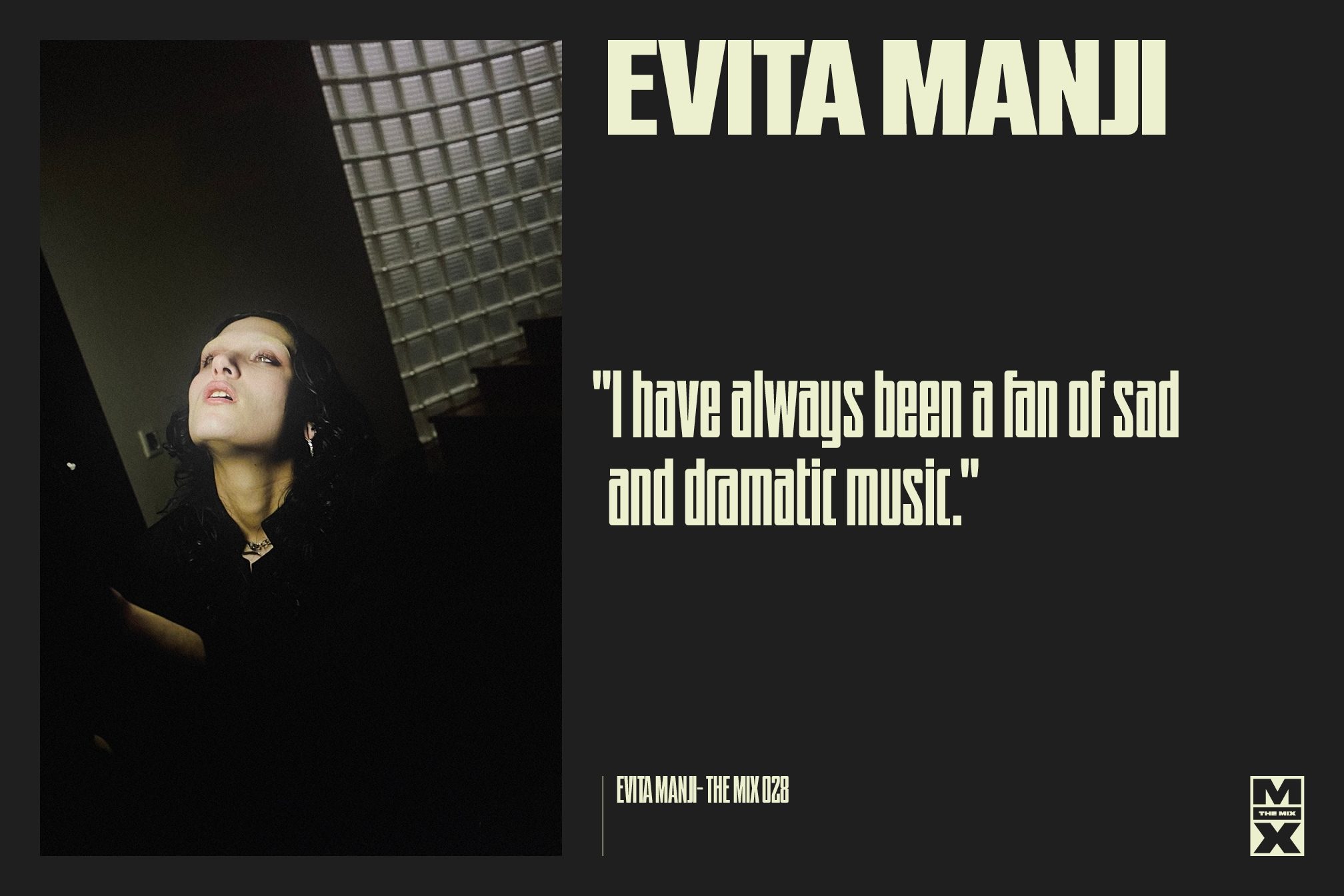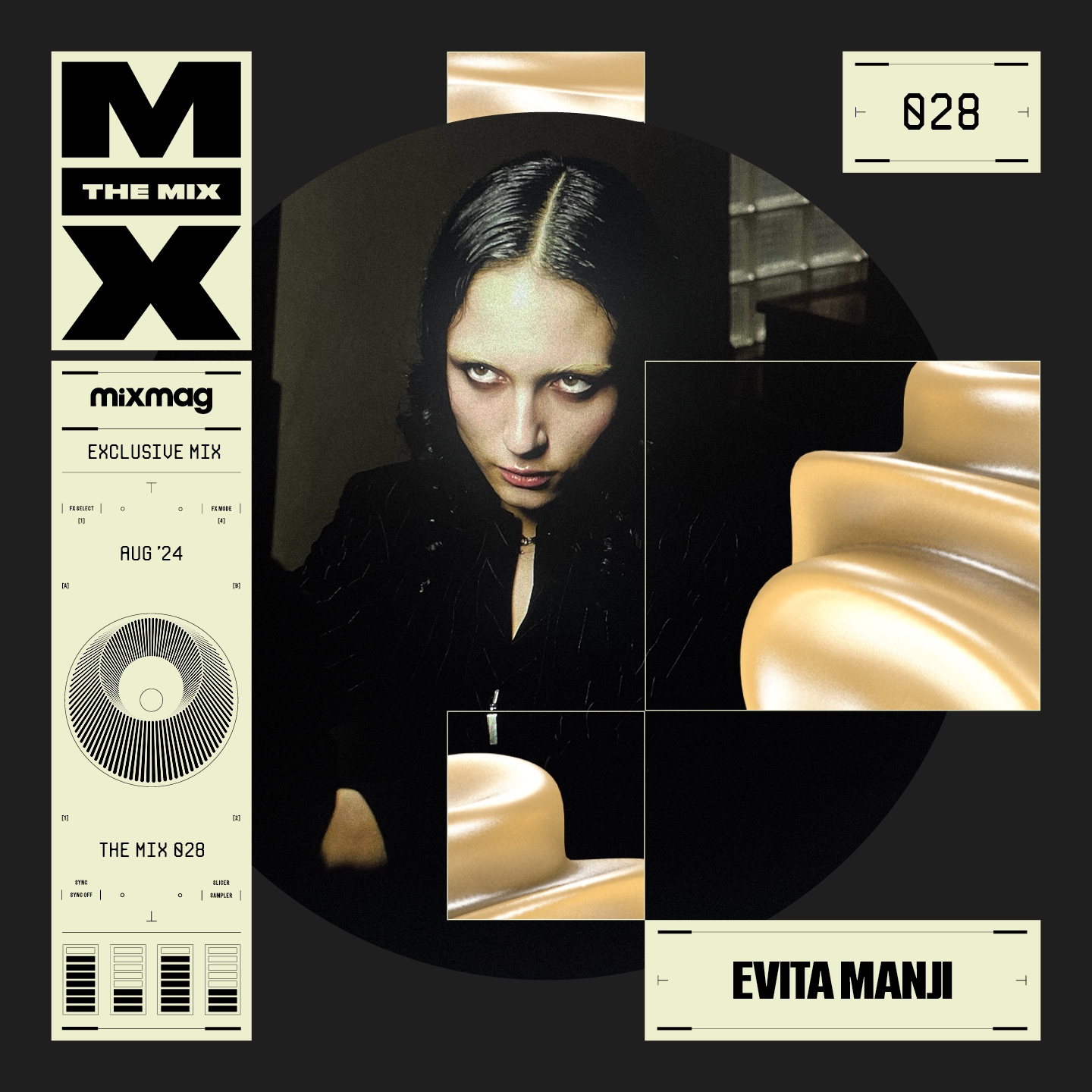 Music
Music
The Mix 028: Evita Manji
Evita Manji shares a dance-oriented mix and speaks to Niamh O'Connor about having a complex relationship with clubbing, working across artistic disciplines, and dealing with challenging feelings through "fun and healing" music-making
Evita Manji is a multi-disciplined artist in every sense of the word. They write lyrics, they sing, they produce, they perform live, they DJ, and they also design, whether it’s graphic, 2D, 3D, or crochet, among other creative endeavours. They also run their own label called myxoxym, which has just released a fundraising compilation called ‘Plasmodium II’ to support the charities ANIMA, Vegan Farm, and Dog’s Voice, following the recent wildfires that blazed in and around Athens (again) this summer. The V/A features many of Evita’s friends from around the world, including 8, Ara XD, Lyzza, Oliver Torr, Iglooghost, Apu Nanu, Raed Raees, axontorr, and more.
Evita’s trajectory as an artist begins in Thessaloniki, where they lived until their teens before moving to Athens, then Berlin, and back to Athens again, where they are currently based. While Evita has released a steady output of music in recent years, they are perhaps most known for their critically acclaimed album ‘Spandrel?', which came out on PAN last year. The album cross-pollinates contemporary club music, baroque pop, and experimental sound design and poses the question of wondering — in the face of immense loss — which elements of ourselves might be for endurance and which might be for decoration. Since the release of ‘Spandrel?’, Evita has performed worldwide, playing live and DJ sets in Melbourne, Mexico, Thailand, Berlin, Italy and beyond. They have also composed soundtracks for art exhibitions and fashion shows around the globe.
Today, Evita continues exploring themes of death, grief, climate change, and the human condition, and makes music and art to process these themes, which they think about daily. Following their most recent release ‘Berlin Nightmare,’ which features on SOPHIE’s upcoming posthumous album, we talked to Evita to learn more about their musical journey and what they’ve been working on since PAN released ‘Spandrel?’. Evita has also put together their most dance-oriented mix for a minute, exploring various moods and some of their all-time favourite tracks.

Tell me about your time growing up in Thessaloniki. What was your musical background at that time?
I think my relationship with music, and also in relation to my hometown, started when I was very, very young because our closest family friends had a studio in the city. And we would — me and my dad, especially — spend a lot of time there, recording music with all of his friends in the studio.
Looking back, those were great times. I still listen to those recordings from when I was eight years old. Sometimes, when I feel lost with my identity and artistry, I often listen back to those songs, and they kind of put me back in place and remind me who I am. And maybe the sound is different, but the energy I was giving and the content of the lyrics are much like the kind of songs I write today and the kind of songs I’ve always wanted to write.
So, I think as a child, I was more into acoustic music with a lot of guitars and drums. But then, we would listen to electronic music at home. I remember my dad was very much into jungle and drum ’n’ bass, so I have memories of those sounds at home.
Also, I was in a choir for many, many years, and that was a big part of my life. I think we had lessons twice a week, and we would travel to festivals all together when we were invited to perform. I also feel that [choir] affected my sound later on, for example, on ‘Spandrel?’. I feel like all these references came out which were not really there before in my sound.
When did you become interested in electronic music?
When I was a teenager, I started getting more invested in electronic music, listening to a lot of dubstep and drum ’n’ bass and a lot of psytrance.
There was a big psytrance scene in Thessaloniki at that time. I remember lying to my mum and saying I was sleeping over at friends, but we would go to a psytrance party, which was not great for a 14-year-old! There were a lot of dodgy people at those parties and thinking back, I’m impressed that nothing bad happened to me. But it was really fun. And it was around that time that I started consciously trying to produce music by myself. I wanted to make psytrance, but I really sucked at it. I couldn’t really understand how to use the software, and because I’m not very patient and couldn’t figure it out quickly, I kind of gave up. And then I didn’t really try to produce music again until I was 15 or 16 when I moved from Thessaloniki to Athens.
What kind of music were you trying to make when you moved from Thessaloniki to Athens?
When I first moved to Athens, I started getting involved in the dubstep and drum ’n’bass scene there. We would go to a lot of parties, and I had a lot of DJ friends, and then we started having our own parties. I wasn’t DJing, but I did some graphic design for those parties. Around that time, I started experimenting with music production again, and it was kind of better. But then, again, I wasn’t satisfied with what I was making. I wasn’t sure what exactly I wanted to sound like.
So I was part of that scene, but it didn’t feel like a sound that truly represented me, you know? But looking back, it’s like this journey where I would enter this little music scene and get something out of it, which then came together in my sound now. But it’s not like I have an “established” sound now. It’s not an issue. I’m trying to be on good terms with the fact that every now and then, I just change my mind and do a different thing.
So I started producing again when I was 15, and it didn’t work again, so I dropped it. Then I started becoming more interested in techno and experimental electronic and club music. I would go out a lot in Athens, and it was alright. But then there was something missing. So I moved to Berlin when I was 18. I was very inspired by everything going on with music there and the fact that many people were ambitious; they were making music, or they were DJs. I partied a lot in Berlin, which was great, and it influenced my early work a lot. Sometimes I miss that. Now I can’t even stay in the club for 10 minutes.
Read this next: How to have the perfect 24 hours in Berlin
How did moving to Berlin shape the next chapter in your musical journey?
That’s when I started DJing and producing again. But it happened in a really funny way. I was just hanging out with my best friend in Berlin, and he was making music on GarageBand on his phone. And I was like, ‘Oh, cool, I also want to do that.’
And then we started jamming together on GarageBand. And because its interface is so much more user-friendly, that’s when I started understanding how music production actually works. So it was an easy entry for me, to enter this really weird world of endless possibilities of music production.
Then I moved back to Athens but I still wanted to make club music. That’s when I made my first EP, ‘Neptune’, that’s primarily club music, but it also has experimental references. At that time, I still wanted to be in the club; the club was my favourite place to be, apart from the beach and the rocks. So I was really focused on that, and then, obviously, the pandemic happened.
Since the release of ‘Neptune’ in 2020, you released two more EPs via your label myxoxym, called ‘EYES/NOT ENOUGH’ and ‘OIL/TOO MUCH’. But your most recent, and perhaps most acclaimed work to date, is your album ‘Spandrel?’ which came out on PAN last year. Do you think this album still encapsulates where you are now as an artist?
I think ‘Spandrel?’ is definitely the most representative work of my true self so far. But also, between ‘Neptune’ and ‘Spandrel?’, so many things happened. The pandemic happened, my relationship with SOPHIE, SOPHIE’s death.
I was always singing, but I was never confident in it. And it was SOPHIE who encouraged me to… she would always tell me I sound great when we would make music, and I’d be feeling insecure on the mic. After her passing, I felt like, ‘I have nothing left to lose, really, so I’m just gonna go full on. I’m just gonna do what feels right. I’m gonna express myself in the best way possible.’
Deep into my grieving, I lost interest in literally everything and somehow, music was the only thing that was giving me joy. And learning about things that would allow me to zoom out from the human experience and the human world, and look outwards and focus on the things that we don’t know about our existence and the universe.
Making music was basically the only thing that made me feel alive, so I was just making music the whole time. I was in my apartment for, I don’t know how long, either making music or not doing anything at all and going through it. So it was really different circumstances that I made this music under than any time before, really.
How has your life and artistic career changed since the release of ‘Spandrel?’?
There was a big change, definitely, after the album came out. I suddenly became a full-time touring artist, and I was, and still am, able to make a living out of my art and fully support myself and don’t have to do anything else. So that was really incredible. That still amazes me.
Also, the love from the people is really heartwarming…I mean, I forget about that very often, and it always surprises me. When I play shows, fans come up to me, and they’re so sweet. It feels very good to be embraced.
The first year after the release, in all of 2023, I was really touring a lot, and it was really fun but also really tough because it took me out of my routine, and it didn’t feel like I had much space and time for myself.
And how are you now?
Since I returned to Athens last winter, it feels like things have gone back to normal. I travel only a little for my shows. I take care of my cat. I spend time with my grandma, which is what I love doing the most. So, the only thing that really changed as of now is the fact that I am independent and I can support myself from my art, which is incredible.

I’d love to know more about your other art forms in 2D design, 3D design and crocheting. How did you get into these other crafts, and are you still doing them today?
I feel like I am a full-time artist, and that applies to all mediums. There are so many things that I have gotten into in my life; it’s kind of difficult to list all of them.
The 3D design, the 2D design, and the crochet stuff; people know more about those because I guess I show them more online. Like the 3D art stuff, I used them mostly for my label and my artwork covers. I did the artwork for my first EP ‘Neptune’, and then I did all the graphics for my label myxoxym, and I’ve done a bit of work for other friends. I don’t do that so often anymore.
I do love to draw. I do love to crochet and sew from time to time because I love making clothes for myself. But more consciously, I am trying to focus on music at the moment. But I feel like, and this also comes from wanting to do everything, I’m learning to trust others. I feel like I wanted to do all these things myself for the label and my cover and all that because I wanted to have total creative control over my work, and I love working alone.
This last two weeks, actually, I started putting together the second compilation for myxoxym and it’s the first time I have asked someone else to do the cover. They’re called Female Pentimento, and their art is incredible, there’s no one else who can translate the feeling of the cause we’re supporting. It’s just right, and I couldn’t do it better. And this compilation is, again, a fundraising compilation. We’re gonna raise money to support the animals affected by the fires this year in Athens.
Do you follow an ethos or creative vision with myxoxym, or is it more like a flexible being that you can change along the way or do whatever you want?
It’s like a flexible being. It’s more like a platform with endless possibilities for turning whatever I feel like turning it into at any time. Currently, it serves as a music label for these fundraising compilations.
In the future, I would like to explore releasing my own music through it, but as I get to know myself better, I am really not someone who can handle all the logistics. I’m quite impressed by how I’m handling the situation now with the compilation, but I think I’m not the right person to run a label.
I’m very slow in general, so that’s also a very slow project. That’s why it took two years to release another compilation. And I don’t want to force it. I don’t want to force myself to do much; I’m happy with how things are and the fact that this platform exists, and I can use it whenever I need it.
As well as producing and performing live sets and running your own label, you’re also a DJ and have recorded a mix for us too. What do you enjoy about DJing, in addition to your other disciplines?
I mean, if you asked me on a regular day about DJing, I would maybe tell you that ‘I hate it’. Or ‘I’m not a DJ.’ But the truth is that when I’m behind the decks, and I’m DJing, I love it. Maybe what I love when I’m DJing now is because I have moved on from making dance music, it is a moment for me where I can embrace that sound and share this moment and music that I like with the people on the dancefloor.
I’m intrigued by the broadness of your sound, both as a DJ and producer. For example, I watched your performance in the chamber in Phoenix Central Park in Sydney, Australia, which was chilling and made the hairs on my arms stand up. But I also listened to your Boiler Room in Athens in 2022, which had a totally opposite vibe in terms of atmosphere and sound. Do you like thriving in vastly different musical crafts and environments?
The thing is, I feel like the vibe I give as an artist is that my music is very sad. It’s very devastating. When I’m performing live, I’m also feeling it, you know, it’s heartbreaking. But I’m not sad all the time.
Sometimes, I make fun music, but it somehow doesn’t feel right to release it. I have always been more of a fan of sad and dramatic music. But then I also love embracing that other part of me, which loves hard club music, dancing, and being more carefree and fun. I mean, it’s that side of me that exists, which I love, but I just feel I don’t allow myself to be like that too often. I get caught up in reality and think about all the devastating things happening around the world.
Actually, nowadays, as I said earlier, I cannot go to a club. I very rarely go to a club if I’m not playing. So DJing is actually a really good opportunity to be in the club and embody that side of me.
What have been the most memorable DJ gigs in the last year or so?
My memory is really bad, but I played in London earlier this year, which was really fun. The people were dancing, and they were loving it. I have this ritual where I always end my DJ sets with this Japanese song from this girl group called Sakura Gakuin, which I’ve been obsessed with for the last 10 years. It’s just the cutest song, and this is always the last impression I get from a DJ set. And if people go hard on that one, I'm happy. I also played in Bristol this year, which was also very fun. These are honestly the only two gigs I remember right now.
Your music explores themes such as death, grief, climate change, and the human condition. Do you ever feel mentally overwhelmed when exploring such themes? If so, how do you manage such feelings?
Making music about it is the fun and healing part because it’s not like I’m forcing myself to think about those things. I think a lot during the day, and it’s mostly about those things, and that’s the overwhelming part: just thinking. But taking action and actually putting them into my music and transforming them into something more useful than just spiralling, that’s the fun part. So, I wouldn’t say it feels overwhelming.
If it does, sometimes I’ll just listen to a track that I made, and it’s very devastating, and I start crying. But it’s good tears because the truth is that I live for the drama. When this happens, I feel so alive. So, I wouldn’t say it’s ever overwhelming to make music about those things; if anything, it’s the exact opposite.
What’s life like in Athens for you at the moment?
I’m living a very quiet life in Athens. My grandma is in Athens, and she is my favourite person on earth, so I love spending a lot of time with her and taking care of her. I love going on nature trips. I don’t like going out, especially in Athens. I feel like the nightlife in Athens is really boring.
Why is it boring?
It’s just that there’s no vibe on the dancefloor, you know? The crowd. I don’t know; I feel like people don’t know how to party. I mean, I haven’t been to many clubs in Athens in the last year or two, so I can’t really say much about it, but the few parties that I’ve been to…the crowd is mostly boring dudes. They don’t know how to move their ass, basically. Or it’s like clubs where you see a lot of queer people, younger people, and everyone is taking selfies and videos and stuff like that, which I don’t like much.
I also cannot handle loud music very well. I just find it terrifying. I need to be behind the booth and be able to control the level of my monitors.
Before this interview, we chatted briefly about some events in Athens you’re working on that take place in tunnels. Can you tell me more about these events, which you also mentioned are not parties, per se?
We have rules, and one of the rules is: ‘no pre-recorded music.’ It’s like a gathering of musicians, non-musicians, friends, and people who want to come and see the performances. But it’s all live performances. It’s mostly ambient, experimental, and noise sounds — you won’t dance in there.
It’s more like a listening experience; we all sit down in the tunnel. Or sometimes, my favourite thing is when we walk all together in the tunnel, and we sing like a choir, but it sounds very atonal because we’re not a choir. But it’s a very beautiful experience, and it just feels like you lose your sense of place and time in there, and everyone is incredible. And because it’s not like a show, no one feels the pressure to bring a “good” show. Many musicians just come and experiment with their sound. That’s what I do as well. Like, I’m not gonna bring my ‘Spandrel?’ live show in the tunnel. I always bring a few loops and then figure it out on the way but amazing things come out from this approach in combination with the sound limitations in there; the feedback is crazy. So even if you don’t want to make noise, it’s going to end up sounding like noise, at least a bit. It’s very fun.
What else are you working on now, and what’s coming up next for you?
I’m working on an album, but I don’t know when it will be out; I’m just letting you all know.
In theory, it’s been almost two years since my last release, but this year, I have produced so much music for other things. I did a residency in Berlin at MONOM, a spatial sound studio. I was working on a 40-minute piece. So it’s basically like I have produced an album, but it’s specifically for the MONOM soundsystem which consists of 48 speakers, so it’s hard to translate that in stereo sound. I might try to do that though.
I also did some commissions this year for fashion shows and videos and stuff like that, which kind of left me with no time and energy to work on my own stuff. But I’m hoping to have an album ready soon.
Can you tell us about your mix?
I had a lot of fun working on this mix, especially because it’s been a long time since I put together a more dance-oriented mix. There’s a lot of music I’ve been enjoying lately and been wanting to play in the club, some of my all-time favourite tracks and a lot of music from the new compilation. It goes through many moods, but that’s how I listen to music myself. Jumping between moods and genres unpredictably. Listening back after I finished it, I realised that it sort of reflects the way I’ve been feeling these days: more hopeful and energised. And it’s sort of like a tale of going out too, ending with Placebo’s 'In the Cold Light of Morning', which is exactly what the end of a night out sounds like.
'Plasmodium II' is out now, get it here
Niamh O'Connor is a freelance music journalist, follow her on Instagram

Tracklist:
Kai Whiston - Lux Forever
Wojciech Kilar - Love Remembered
Yakovlev - Deep Dive
Lyzza - Prosecco Girl
Evita Manji, Oliver Torr - Reality/Shadows
Apu Nanu - quartzzz
Ice_Eyes, Locre - Astra
Van Boom - Object Mapping ft. Safety Trance & Evita Manji
Sevdaliza - Ride Or Die, Pt.2 ft Villano Antillano & Tokischa
Emma DJ - RR.dnk
Rick Farin - Life Strobe
Timo Mass - First Day ft. Brian Molko
Otik - Downcast
Ludwig Wandinger - Openfield
Ara XD - Wintergarden
Lanark Artefax - Metallur
Iglooghost - carti ⋯ URTHEMOON 「ᶦᵍˡᵒᵒᵍʰᵒˢᵗ ᵇᵒᵒᵗˡᵉᵍ」
Nick Leon, Erika De Casier - Bikini
Kamixlo - EGO FRAGILE/SPIRIT WEAK
Croatian Amor, Scandinavian Star, School of X - New Healer
Heith - “<>*e
Bohren & Der Club of Gore - On Demon Wings
Placebo - In the Cold Light of Morning


